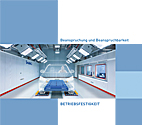Thermomechanical Fatigue

Many construction components used in the automotive, power generation and aerospace industry are subjected to cyclical thermal loads. The resulting thermomechanical fatigue can affect the components’ dimensions. Material inhomogeneities caused during manufacturing, for instance, may also have a strong influence on the component’s service life. In order to reliably assess the durability of a component, manufacturers need to understand and consider any relevant thermomechanical effects of material defects.
IABG determines the thermomechanical deformation behaviour of components based on flow and temperature field calculations and uses deformation models that consider the elastic, plastic and viscous properties of the materials used. The models are parametrised by means of uniaxial, thermomechanical fatigue tests.
A component’s service life is determined using damage models and the results of the deformation calculations. The degree of damage also depends on material defects which are therefore equally taken into account in the analysis. Custom test benches are installed to validate the simulation and examine the thermomechanical properties of the components when exposed to operational loads.
IABG thus provides a method for the service life assessment and optimisation of components subjected to thermomechanical loads. In addition, this method takes into consideration potential material defects. This test and calculation procedure enables the derivation of standards for effective quality assurance and process optimisation. It also helps manufacturers leverage materials’ load-bearing potential more effectively and shorten development times.
THERMOMECHANICAL FATIGUE TESTS
- Cyclical thermal and mechanical loading
- Performed in accordance with the Code-of-Practice for Strain-Controlled Thermo-Mechanical Fatigue Testing
- Controlled mechanical and plastic strain or strain constraint
- Temperature range: 50 °C - 1200 °C
- Support for the smallest dimensions (l = 80 mm)

MATERIAL AND DAMAGE ANALYSES
- SEM and μ-CT
- Proof of material defects
- Derivation of characteristic parameters for thermomechanical fatigue
- Determination of damage mechanisms
- Definition of remedial measures
- Discovery of the primary cause of damage
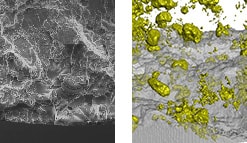
MATERIAL MODELLING
- Setup and extension of viscoplastic material models for TMF loading
- Temperature-dependent parameter identification
- Mechanism-based damage models for service life calculations
- Consideration of material defects in service life assessment
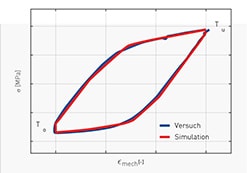
COMPUTATIONAL FLUID DYNAMICS (CFD)
- Coupled fluid-structure simulation (conjugate heat transfer) to determine components‘ temperature field in customer-specific load cases
- Calculation of the variable temperature distribution over time on component surfaces
- Determination of the optimisation potential for all components relevant in terms of fluid mechanics
- Calculation of volume flow rates under real operating conditions
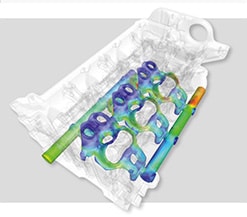
FEM SIMULATION
- Structural calculations using viscoplastic material models
- Assessment of position of failure and service life depending on deformation and microstructural damag
- Automated calculation processes and customer-specific implementation in FE software
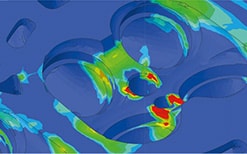
COMPONENT TESTS
- Validation of calculations for temperature profile, position of failure and service life
- Observance of operational loads
- Component damaging in accordance with real use scenarios
- Observance of all component material properties
- Determination of crack propagation
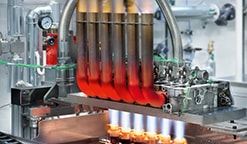
- VDA ISA TISAX zertifiziert für die Labels „Informationen mit sehr hohem Schutzbedarf“, „Prototypenschutz“ und „Datenschutz“ für die Standorte Ottobrunn und Lichtenau
- ISO 14001
- ISO 9001
- DIN EN ISO/IEC 17025 for Fatigue Strength Laboratory
- DIN EN ISO/IEC 17025 für das Betriebsfestigkeitslabor - Verzeichnis der Prüfverfahren
- Accreditation Calibration Lab for Mechanical Units according to DIN EN ISO/IEC 17025
Wärtsilä Finland Oy, 2016
Gutor by Schneider Electric (Schweiz), 2015

